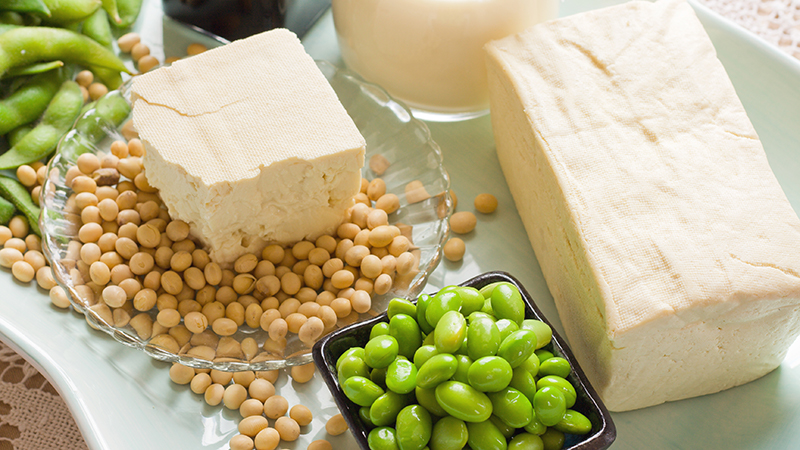Soy and Children

By Reed Mangels, PhD, RD
When I was teaching undergraduate nutrition, I asked students to plan a one-day menu for a 5-year old vegan. Note, that these were non-vegetarian dietetics students. Here’s what one of them submitted:
Breakfast
English muffin sandwich with scrambled tofu and veg sausage, soymilk
Lunch
Soy yogurt with granola, soymilk, apple, baby carrots with soy butter
Dinner
Stir-fry with edamame, tofu, and broccoli; brown rice; soymilk; soy-based frozen dessert
Snack
Smoothie with soymilk and strawberries
My comment? This menu seems over-focused on soy. Because of the student’s apparent misunderstanding that vegans need a lot of soy to get adequate protein, the menu lacks variety. If we were to replace every serving of soy with a hamburger, or with a banana, or with a glass of cow’s milk, it would still be a menu that lacks variety. There’s just too much of one kind of food. I suggested some changes – replace the yogurt at lunch with a hummus dip or a bean burrito; try hash-browns or fruit with breakfast instead of “sausage”; add more vegetables to the stir-fry in place of some of the tofu and/or edamame; have a fruit-based dessert likes a wedge of watermelon or apple cake instead of a soy-based dessert; make the smoothie with another fortified plant milk. All of these changes will add variety. It’s not that there is something inherently wrong with soy – it’s just too much of a good thing in a menu like this.
Some parents and caregivers wonder if children should eat soy at all and have questions about soy safety. The short answer – research supports the idea that soy is safe for children and that it may offer short-term and long-term health benefits. In addition, soy foods can add variety if used in moderation. Of course, children with a soy allergy should avoid products containing soy.
Soy foods are an excellent source of protein and essential amino acids; they are also low in saturated fat, free of cholesterol, and high in unsaturated fat. Soymilk is often fortified with calcium, vitamin D, and vitamin B12; some brands of tofu are good sources of calcium and may be fortified with vitamin B12; tofu-based veggie “meats” may be fortified with iron, zinc, and vitamin B12.
Women who ate moderate amounts of soy foods in childhood and adolescence, appear to have as much as a 60% lower risk of breast cancer later in life.1-4 This is especially the case when soy foods were eaten in childhood.
Another advantage of soy is its versatility. For children who want to fit in, veggie “bologna” sandwiches and tofu “hot dogs” can make their lunchbox look like that of their classmates’. Concerns about the safety of soy for children appear to be unfounded. There is really no scientific support for claims like soy having a feminizing effect or producing adverse hormonal effects in children in amounts typically eaten.5-8 Based on intakes of traditional societies, a couple of servings of soy appears to be safe during childhood.
References
1. Korde LA, Wu AH, Fears T, et al. Childhood soy intake and breast cancer risk in Asian American women. Cancer Epidemiol Biomarkers Prev. 2009;18(4):1050–1059.
2. Shu XO, Jin F, Dai Q, et al. Soyfood intake during adolescence and subsequent risk of breast cancer among Chinese women. Cancer Epidemiol Biomarkers Prev. 2001 May;10(5):483-488.
3. Wu AH, Yu MC, Tseng CC, et al. Dietary patterns and breast cancer risk in Asian American women. Am J Clin Nutr. 2009 Apr;89(4):1145-1154.
4. Lee SA, Shu XO, Li H, et al. Adolescent and adult soy food intake and breast cancer risk: results from the Shanghai Women’s Health Study. Am J Clin Nutr. 2009 Jun;89(6):1920-1926.
5. Messina M, Rogero MM, Fisberg M, Waitzberg D. Health impact of childhood and adolescent soy consumption. Nutr Rev. 2017;75(7):500-515.
6. Wada K, Nakamura K, Masue T, et al. Soy intake and urinary sex hormone levels in preschool Japanese children. Am J Epidemiol. 2011 May 1;173(9):998-1003.
7. Maskarinec G, Morimoto Y, Novotny R, Nordt FJ, Stanczyk FZ, Franke AA. Urinary sex steroid excretion levels during a soy intervention among young girls: a pilot study. Nutr Cancer. 2005;52(1):22-28.
8. Zung A, Shachar S, Zadik Z, Kerem Z. Soy-derived isoflavones treatment in children with hypercholesterolemia: a pilot study. J Pediatr Endocrinol Metab. 2010;23(1-2):133-141.
Reed Mangels, PhD, RD is a Nutrition Advisor for The Vegetarian Resource Group.
